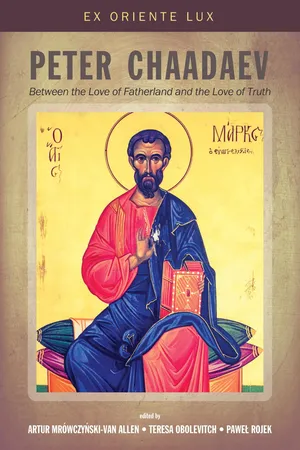![]()
part i
Ideas
![]()
1
Peter Chaadaev
Prolegomena to the Philosophy of Russia as a Peripheral Empire
Andrzej Walicki
It may sound strange, but my interest in Chaadaev began as early as the fifties and thus it is already sixty years old. I wrote about Chaadaev in my first book Personality and History, published in the late fifties, then in the large monograph on the great debate of the Slavophiles and Westernizers (the title of its English version is The Slavophile Controversy), then in A History of Russian Thought: From the Enlightenment to Marxism (for many years an academic textbook in the USA), recently published in Russian, and finally in the book Russia, Catholicism and the Polish Question (2002).
I had a happy opportunity to discuss the Chaadaev legacy with people such as Isaiah Berlin and Leonard Schapiro—in England; Zakhar Kamenskij—in the USSR; Martin Malia, Raymond McNally and Richard Tempest—in the USA; Francois Rouleau—in France; Tsuguo Togawa and Haruki Vada—in Japan, as well as, which is really important, with the outstanding representatives of the “first wave” of Russian emigration such as Fr. George Florovsky, Roman Jakobson, the well-known historian of the Russian religious Renaissance Nikolai Zernov, and the Harvard economist of the Russian origin Alexander Gerschenkron, an author of the influential book Economic Backwardness in Historical Perspectivе.
My interpretation of Chaadaev’s thought mainly focused on the problem which I defined as “Chaadaev’s paradox.” I saw a paradox in Chaadaev’s ideas when the author of Philosophical Letters found it impossible to apply his social philosophy to his own country; in the European context, he was a convinced conservative, a disciple of the French traditionalists—Joseph de Maistre and Louis de Bonald, whereas he defined his native country as “a blank sheet of paper,” tabula rasa, on which a rationalistic reformer was free to write anything. In other words, he saw Russia as a country without history, without traditional foundations and inner, spontaneous development; as a country rejected by Providence, devoid of its own “moral idea,” unable of being conservative since it had no heritage which was worth maintaining. Thus, as a European, Chaadaev was a staunch conservative in the spirit of French “theocrats,” whereas as a Russian patriot, he could only be a radical reformer “from above” whose desire for Russia was a new Peter the Great.
This is how it is; however, in the light of the twentieth-century historical experience various combinations of the conservative worship of traditions, on the one side, with the approval of autocratic reforms “from above,” on the other side, do not appear as something exceptional, solely characteristic of countries devoid of the so-called “organic development.”
In the present chapter, I will discuss Chaadaev’s “philosophy of Russia” in terms of general problems related to peripheral development as they are described in works of Immanuel Wallerstein. In the context of these problems, Chaadaev’s philosophy of Russian history stands out as an important attempt at understanding the fate of Russia as a peripheral empire which seeks its place and tasks in the world history. Chaadaev’s ideas pertinent to this theme may be grouped in three interrelated parts:
1. Peripheral status as a misfortune,
2. Peripheral status as a privilege,
3. Overcoming peripheral status as a task.
My own work on the place of economics in the intellectual history of pre-revolutionary Russia, which I wrote in connection with the project on the inheritance of the so-called Warsaw school of the history of ideas, helped me in selecting and formulating these problems. The problems which I focused on unwittingly revived in my memory talks with the abovementioned Alexander Gerschenkron, in Harvard in 1960, on two stages of the debate on the economic modernization of Russia, namely: the dispute of the Slavophiles with the Westernizers in the first half of the nineteenth century and the later dispute of the populists with the Marxists. Already then did I succeed in drawing the attention of my conversationalist to the fact that the priority in recognizing a specific privilege of accelerated development typical of tarde venientibus, that is, of countries which were late in joining social development, belonged to Chaadaev. Gerschenkron defined this as the privilege of backwardness, and he agreed with me that Alexander Herzen (to whom he used to ascribe the authorship of this thought) was indebted to Chaadaev in this respect. Soon I developed these ideas in the comprehensive introductory article to the two-volume anthology on Russian populists and further in the book on this subject published in English in 1969 (translated into Spanish, Italian, and Japanese).
In this chapter, I will not limit myself to solely economic issues. My task is to identify those issues as part of the general, integral history of ideas.
Peripheral Status as a Misfortune
In spite of our wide-spread opinion, the Russian Empire created by Peter the Great was not born under the conviction of the orthodox Russia’s central position in the Christian world, which found its expression in the idea of Moscow as the Third Rome. By contrast, the tsar-reformer despised orthodoxy and saw a much greater value in Lutheranism (to which he sympathized) or Catholicism. Similar to this was his attitude to the national identity of the country’s population which was eloquently manifest in the tsar’s attitude to the project of introducing in Russia the Dutch language as an official language of educated social classes.
As known, Peter’s reforms in Russia resulted in a deep chasm between the educated “society” (i.e., Europeanized aristocracy) and the Orthodox “people.” This chasm did not decrease under the influence of the social character of the victory over Napoleonic France. In spite of the Christian religiosity renaissance, declared from above by the emperor Alexander, the chief ideologue of the Holly Alliance, this act did not entail a return to the orthodox Christianity. The religious renaissance of that t...
